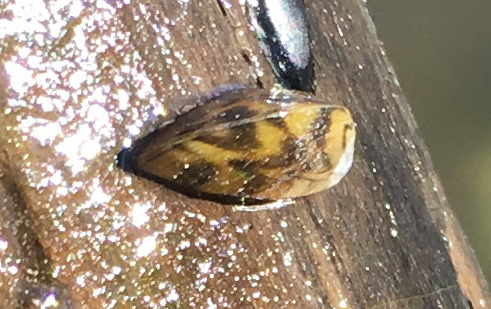Zebra mussels
The Problem with Zebra Mussels
The Zebra Mussel (Dreissena polymorpha) is native to Eastern Europe and Western Russia. The small mussels with striped, D-shaped shells live underwater and were accidentally released into the Great Lakes. First discovered in 1988, the invasive mussel has spread to several states including Minnesota.
Zebra mussels cause recreational, economic, and ecological damage. They attach to equipment such as boat motors, causing poor performance and costly repairs. Their sharp shells also pose a hazard to swimmers, who can cut their feet as they encounter zebra mussel-encrusted objects such as docks, rocks, and swim rafts.
The invasive mussels damage aquatic systems by outcompeting larval fish and other animals for food. They also attach to and kill native mussels.
For more information, see the Minnesota DNR zebra mussel page.
RPBCWD Lakes Impacted by Zebra Mussels
The following lakes with RPBCWD have confirmed zebra mussel infestations:
- Riley (listed as infested in 2018)
- Lotus (listed as infested in 2019)
- Ann (listed as infested in 2023)
For a full list of infested lakes, see the Minnesota DNR infested waters page.
Zebra Mussel Monitoring
RPBCWD monitors for zebra mussels through:
-
annual zebra mussel veliger sampling
-
semi-monthly boat launch scans
-
eDNA testing
-
public access adult zebra mussel monitoring plate
-
Carver County invasive species searching transects
More information about monitoring and control of invasive species can be found in the Water Resources Report in Annual Reporting .
If you live on a lake and would like to help monitor for zebra mussels, check out our Adopt a Dock Program.
Help Control the Spread of Zebra Mussels
- CLEAN off visible aquatic plants, animals, and mud from all equipment before leaving water access.
- DRAIN watercraft bilge, livewell, motor and other water containing devices before leaving water access.
- DRY everything for at least five days OR wipe with a towel before reuse.
Learn more at Stop Aquatic Hitchhikers.org
Contact
Josh Maxwell, Water Resources Coordinator
952-607-6512 ext. 4
Reports
- Lake Riley Zebra Mussel Assessment (10/22/2018)
- Lotus Lake Zebra Mussel Infestation Report (10/25/2019)
- Lake Ann Zebra Mussel Assessment (7/19/2023)
Related content
- News release - Zebra mussels confirmed in Lake Ann - July 2023 (8/1/2023)
- MnDNR news release: Zebra mussels confirmed in Lake Ann (7/31/2023)

Zebra mussel attached to wooden post.